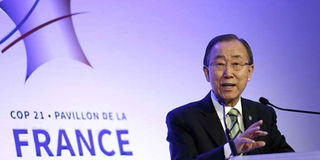Climate change fight plan drafted

United Nations Secretary-General Ban Ki-moon delivers a speech during the "Arctic/Svalbard" presentation at the COP21 UN Climate Change conference in Le Bourget, northeast of Paris, on December 5, 2015. Any deal emerging from Paris is likely to fall far short of what is needed to cap global warming at 2.0 degrees Celsius or below. PHOTO | THOMAS SAMSON | AFP
What you need to know:
- Ministers from across the world will descend on Paris from Monday to try to transform the draft into an agreement that can rein in emissions that trap the Sun’s heat, warming Earth’s surface and oceans.
- However, cutting emissions requires a shift away from burning coal, oil and gas for energy, as well as from the destruction of carbon-storing rainforests — costly exercises that powerful business interests are determined to press on with.
LE BOURGET
Negotiators from 195 countries delivered a blueprint for a pact to secure humanity from the consequences of rampant emissions of climate-altering greenhouse gases.
Despite being riddled with conflicting proposals on most key points, the draft drawn up in four years of tough talks is the skeleton of what has been described as the most complex and consequential global accord ever attempted.
The stakes are high.
Ministers from across the world will descend on Paris from Monday to try to transform the draft into an agreement that can rein in emissions that trap the Sun’s heat, warming Earth’s surface and oceans.
“In the words of Nelson Mandela, it always seems impossible until it is done,” said South Africa’s negotiator Nozipho Mxakato-Diseko after the 48-page draft accord was adopted to loud applause.
Scientists warn that the planet will become increasingly hostile for mankind as it warms, with rising sea levels that will consume islands and populated coastal areas, as well as storms and severe droughts.
However, cutting emissions requires a shift away from burning coal, oil and gas for energy, as well as from the destruction of carbon-storing rainforests — costly exercises that powerful business interests are determined to press on with.
More than 50 personalities committed to combating climate change, from Sean Penn to US billionaire Michael Bloomberg and Chinese internet tycoon Jack Ma, gathered to inspire the UN conference at Le Bourget on the northern outskirts of Paris.
HIGH STAKES
“Perhaps this is the most exciting time in human history,” Penn told a special event at the conference.
“Those illusions of having too many difficult choices have always created chaos. Now we live in a time where there are no choices. We have certainty. The days of dreams have given way to the days of doing.”
Negotiators seem confident they can avert a repeat of a similar effort that failed spectacularly in the 2009 edition of the annual UN talks in Copenhagen, which aimed at a post-2012 deal but broke down, riven by recriminations between rich and poor nations.
It was two years after that failure, at Durban in 2011, that nations agreed to try again for a truly universal climate-saving pact.
Any deal emerging from Paris is likely to fall far short of what is needed to cap global warming at 2.0 degrees Celsius or below.
The key, analysts say, will be agreement on a review every five years at which nations’ commitments may be strengthened, a so-called ratcheting-up mechanism.





